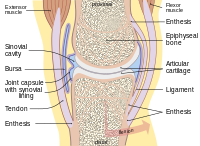
Photo from wikipedia
Alzheimer’s disease (AD) is a complex neurodegenerative disease that requires extremely specific biomarkers for its diagnosis. For current diagnostics capable of identifying AD, the development and validation of early stage… Click to show full abstract
Alzheimer’s disease (AD) is a complex neurodegenerative disease that requires extremely specific biomarkers for its diagnosis. For current diagnostics capable of identifying AD, the development and validation of early stage biomarkers is a top research priority. Body-fluid biomarkers might closely reflect synaptic dysfunction in the brain and, thereby, could contribute to improving diagnostic accuracy and monitoring disease progression, and serve as markers for assessing the response to disease-modifying therapies at early onset. Here, we highlight current advances in the research on the capabilities of body-fluid biomarkers and their role in AD pathology. Then, we describe and discuss current applications of the potential biomarkers in clinical diagnostics in AD.
Journal Title: Diagnostics
Year Published: 2020
Link to full text (if available)
Share on Social Media: Sign Up to like & get
recommendations!